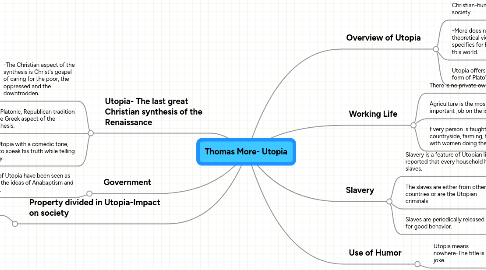Thomas More- Utopia
von ruth nazanin

1. Utopia- The last great Christian synthesis of the Renaissance
1.1. -The Christian aspect of the synthesis is Christ's gospel of caring for the poor, the oppressed and the downtrodden.
1.2. The Platonic, Republican tradition is the Greek aspect of the synthesis.
1.3. More wrote Utopia with a comedic tone, allowing him to speak his truth while telling a deeper story.
2. Property divided in Utopia-Impact on society
2.1. More calls society pigs.
3. Government
3.1. The politics of Utopia have been seen as influential to the ideas of Anabaptism and Communism.
4. Overview of Utopia
4.1. -Thomas More's Utopia is a Christian-humanist view of an ideal society.
4.2. -More does not simply offer a theoretical view, but provides specifics for how to create this world.
4.3. Utopia offers a Christianized form of Plato's Republic.
5. Use of Humor
5.1. Utopia means nowhere-The title is a joke.
6. Working Life
6.1. There is no private ownership.
6.2. Agriculture is the most important job on the island.
6.3. Every person is taught it and must live in the countryside, farming, for two years at a time, with women doing the same work as men.
7. Slavery
7.1. Slavery is a feature of Utopian life and it is reported that every household has two slaves.
7.2. The slaves are either from other countries or are the Utopian criminals
7.3. Slaves are periodically released for good behavior.


